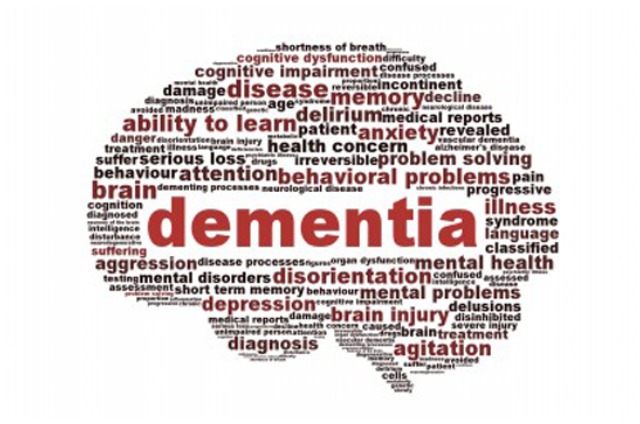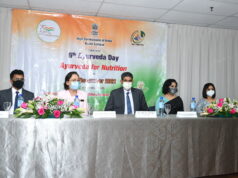KUALA LUMPUR — Imagine how you would feel if you wake up one morning in the house you have lived with your family for about 30 years and you are not able to recognise your surroundings. You look at the mirror and ask yourself, “Who am I, where am I?”
This is one of many symptoms indicating that you may have dementia, a debilitating disease that takes away the ability to retain memory, think clearly, behave normally and perform everyday activities.
Dementia is an increasingly common disease affecting ageing populations in especially low- and middle-income countries where access to social protection, services, support and care is limited.
According to the World Health Organisation (WHO), around 50 million people have dementia, with 60 percent of them living in low- and middle-income nations that report nearly 10 million new cases every year.
WHO also revealed that the estimated proportion of the general population aged 60 and above with dementia at a given time is between five and eight percent.
According to Alzheimer’s Disease International, of which Malaysia is a member, 123,000 people in Malaysia had dementia in 2015. The number is expected to rise to 261,000 by 2030 and 590,000 by 2050.
WHAT IS DEMENTIA?
Dementia is an overarching terminology used to describe various symptoms of cognitive decline, where Alzheimer’s Disease (AD), which causes memory loss and impaired thinking skills, is the most common form.
Other forms include vascular dementia, dementia with Lewy bodies (abnormal aggregates of protein that develop inside nerve cells), and a group of diseases that contribute to frontotemporal dementia (degeneration of the frontal and temporal lobe of the brain).
The boundaries between different forms of dementia are indistinct and often mixed forms coexist.
Universiti Malaya Specialist Centre (UMSC) consultant geriatrician Prof Dr Shahrul Bahyah Kamaruzzaman said AD is irreversible and as it progresses to a more moderate and severe form, it can affect even the performance of simple tasks and functional ability.
“It is quite a devastating diagnosis to many, not only to the patients but also the ones who look after them,” she told Bernama in an interview recently.
Early signs of AD may be forgetting recent events or conversations and as the disease progresses, the person may develop severe memory impairment and lose the ability to carry out everyday tasks.
AD is primarily the most common type of dementia and it contributes to 50 to 70 percent of dementia cases. Vascular dementia is fairly common in Malaysia and can occur on its own or alongside AD.
Vascular dementia is usually caused by impaired blood flow to the brain due to a narrowing or blockage of blood vessels leading to brain cell damage. This may result in problems with reasoning, planning, judgment, memory and other thought processes.
One can develop vascular dementia after a significant stroke, but not all strokes cause dementia.
Noting the general misinterpretation that AD and dementia are two separate diseases, Dr Shahrul Bahyah stressed that AD is a form of dementia and there are many contributory factors such as genetics, lifestyle and environment.
Having said this, memory loss and cognitive decline can be prevented and even reversed if risk factors such as a sedentary lifestyle, poor diet and diseases like diabetes and hypertension are detected and treated early.
Dr Shahrul Bahyah said in Malaysia, patients diagnosed with AD or other dementias often present to the doctors late, having had the symptoms of forgetfulness for many years prior to that. It is important that people are made aware of the fact that dementia is a disease and not part of the normal aging process, she pointed out.
NOT JUST OLDER ADULTS
Most people with AD have the late-onset form of the disease, in which symptoms become apparent, in their mid-60s.
However, Shahrul Bahyah said a small number of people develop early-onset AD where the symptoms of cognitive decline and memory loss occur when they are in their 30s to 50s.
“Globally and in Malaysia, the risk of developing AD is from the age 60 onwards, but people who develop early-onset AD may be genetically predisposed,” she added.
While there has been no discovery of a specific gene that causes late-onset dementia, there is a cluster of risk genes called apolipoprotein E (APOE) that is associated with a higher risk of developing early-onset dementia, she explained.
This gene has several forms. One of them, APOE ε4, increases a person’s risk of developing the disease and is also associated with an earlier age of disease onset.
Although a person with apolipoprotein E mutation in their gene has a bigger risk of developing early-onset AD, Dr Shahrul Bahyah pointed out that some people without the gene can also develop the brain disorder.
TREATMENT FOR AD
Although there are treatments available for patients with AD and dementia as a whole, it can be complex – the reason being the disease does not affect one patient the same way as another.
Dr Shahrul Bahyah explained that pharmacological treatment is not curative management but to enhance the brain’s ability to maintain its connections and to reduce the decline in the remaining neurotransmitters that are needed to preserve the brain functions.
An important part of dementia management is non-pharmacological, which involves strategies geared towards improving patients’ cognitive performance in order to maintain or improve their independence for as long as possible.
Person-centred care includes an assessment and management of the patient’s risk factors to dementia and their diet, lifestyle and support environment.
Memory training, mental and social stimulation, as well as physical exercises are some of the things that can help to manage dementia.
“As we get older, we also have a lot of other diseases to contend with. The management of the underlying risk factors to dementia such as diabetes, high blood pressure, high cholesterol, obesity, previous stroke, as well as poor nutrition and low physical activity levels can be tackled early to delay or even prevent the onset of dementia.
“I usually say to my patients that non-pharmacological management is the key to reversing some of the dementia risk factors when detected early,” added Dr Shahrul Bahyah.
LIFESTYLE
Although AD is irreversible and the overall cognitive trajectory may decline over time, some patients with the disease do improve or stabilise for periods of time.
This can be in response to treatment with Alzheimer’s medication or in response to treatment of other coexisting medical conditions, particularly depression.
Dr Shahrul Bahyah noted that improving one’s lifestyle, diet and environmental factors, and educating family members about AD and dementia will go a long way in making patients feel better.
As Alzheimer’s disease progresses to its last stages, brain changes begin to affect physical functions such as swallowing, balance and bowel and bladder control.
These effects can increase vulnerability to additional health problems such as pneumonia, malnutrition or dehydration. Other poor outcomes include falls and fractures, and if confined to bed, bedsores may develop.
WHO recently stated that many cases of cognitive decline could be delayed or prevented by getting regular exercise, not smoking, avoiding harmful use of alcohol, weight control, eating a healthy diet, and maintaining healthy blood pressure, cholesterol and blood sugar levels.
Research and studies also indicate a consistent relationship between the development of cognitive impairment and dementia with lifestyle-related risk factors such as physical inactivity, unhealthy diets, insufficient sleep, working night shifts, tobacco use and harmful use of alcohol.
Apart from behavioural risk factors, cardiometabolic diseases, obesity, hypertension, diabetes, stroke and high cholesterol, as well as depression, are also associated with an increased risk of dementia.
DIET
UMSC clinical dietitian and dietetic manager Rozanna M Rosly said when AD patients are referred to her, she would assess their present diets and nutritional intake in addition to addressing any nutritional deficiencies or diet-related/physical problems that may be present in the patients such as chewing and dental issues as well as sleeping patterns.
She said nutritional and diet intervention is individualised depending on the patient’s dietary assessment (food diary), food intake, physical activity/mobility, social support, appetite, living environment, financial restraints and medical conditions.
“Normally, if patients are referred with home blood sugar/blood pressure monitoring diary and thorough blood investigation results, we mainly target to control their medical condition, in addition to thoroughly assessing their nutritional deficiencies,” said Rozanna.
Dietary advice and intervention may not be easy for elderly patients as not all of them are very open to dietary changes. They tend to stick to a certain diet (for example, diabetic or low-salt diet) or certain food choices.
Rozanna said the dietary intervention and advice should address the nutritional needs of the patients and research has shown that specific recommended diets can delay the onset of AD.
According to the National Health and Morbidity Survey 2019, 95 percent of adults in Malaysia did not eat the recommended daily amount of vegetables and fruits.
Studies carried out on the Mediterranean diet, DASH (Dietary Approaches to Stop Hypertension) diet and the more recent MIND diet have shown reduced risk/prevention of AD/dementia.
The Mediterranean diet emphasises the consumption of healthy fats such as olive oil, fresh fruits, vegetables, legumes and nuts while the DASH diet focuses on reducing the consumption of carbohydrates and sodium.
More recently, the Mediterranean-DASH Intervention for Neurodegenerative Delay Diet, more popularly known as the MIND diet, has shown to slow down cognitive decline.
The MIND diet recommends a dietary focus on “good” foods such as whole grains, green leafy and other vegetables, berries, fish, poultry, beans, nuts and olive oil while minimising intake of “bad” stuff such as red meats, butter, margarine, cheese, fast foods and desserts.
NON-PHARMACOLOGICAL INTERVENTION
“Caring for a person with dementia such as Alzheimer’s disease demands a great deal of time, patience and commitment from caregivers and family members.
“It is important that part of managing someone with dementia also includes the training of caregivers. This is to create awareness, education and skills needed to maintain a healthy and supportive environment and relationship between AD patients and their caregivers,” said Dr Shahrul Bahyah.
She said organisations like Alzheimer’s Disease Foundation Malaysia and members of Universiti Malaya Medical Centre’s Geriatric unit and Memory clinic advocate comprehensive training for caregivers.
“Caregivers are angels because caring for someone with dementia can be physically exhausting, emotionally challenging and an all-consuming journey for them. Hence, it is very important that adequate support is provided to caregivers,” she added.
– BERNAMA











